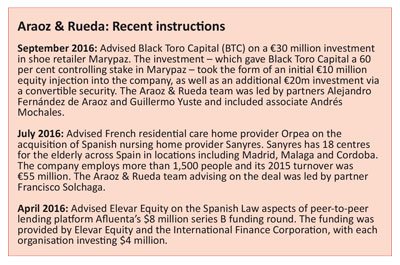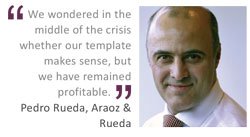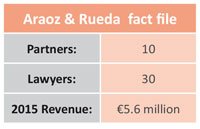Rising up – Araoz & Rueda
Revenue is on the increase again at Araoz & Rueda after several tough years – though the firm has considered a number of merger offers in the past, it continues to cling fiercely to its independence
After a number of years of declining revenues, there are signs that Spanish M&A boutique firm Araoz & Rueda is turning a corner. In 2015, the firm reported annual revenues of €5.6 million, up 19 per cent on the previous year’s total of €4.7 million and the highest yearly billing figure since 2012. What has brought about the change in fortunes? Partner Pedro Rueda sums it up thus: “We’re mainly a transactional firm, M&A activity has recovered in the areas we target – we’re focused on mid-sized and small deals.” Rueda highlights the energy sector, in particular, as being “extremely active” and says that, in addition, arbitration, employment and restructuring work is also on the increase.
As the revenue figures indicate, the 2008 financial crisis was tough on the firm. It now has 30 lawyers in total – ten partners and 20 associates – marginally fewer than the 33 it had before the crisis started. Rueda says that the firm’s strategy for dealing with the difficult economic conditions was to not replace lawyers that left for other firms and keep expenditure to a minimum. “Though our income reduced, we have small overheads and we managed to keep profitability,” says Rueda. “We’re very prudent with our expenses, though we have kept investing in mentoring, preparing and training our associates.”
 Clients still loyal
Clients still loyal
Rueda rejects suggestions that the firm’s revenue dropped in recent years because it was losing a lot of clients – he says that the firm regularly monitors the amount of clients it gains and loses and concludes that clients have generally remained loyal and that the decrease in revenue was due to a decline in deals activity.
Rueda admits that, during the crisis years, with the economic conditions taking their toll on the firm, the partners spent time reconsidering their strategy. “We wondered in the middle of the crisis whether our template makes sense, but we have remained profitable,” says Rueda. “2015 was a very good year and, in 2016, we will try to increase our revenue.”
There have been many occasions since Araoz & Rueda was formed in 1984 when the firm has been approached by other firms about the possibility of merging. “When we were established, there were only around three or four Anglo-Saxon firms in Spain, but since then, all the major Anglo-Saxon firms have opened,” Rueda says. “Many have offered us the possibility of joining them, but we’ve always said ‘no’ – every time we have considered it, but we enjoy the freedom of decision-making, we want to enjoy a better life though we may not bring so much money home.” Rueda declines to confirm which law firms have approached Araoz & Rueda down the years, but it is believed that Linklaters and Ashurst are among the firms that have been suitors in the past.
Nurturing talent
In regard to day-to-day operations, Rueda says that the firm does not have a managing partner. “We can’t afford to have one partner exclusively focusing on management, so each partner plays a role,” he adds. “We have partners who are responsible for different areas such as marketing, accounts, office management, knowledge management and recruitment.” Rueda says that, every Monday, all of the firm’s lawyers meet: “It’s easy for everyone to gather together for a 15-minute session on matters for the week.” He adds that the firm has a quarterly partner meeting, though the partners rarely vote with the preference being for all the partners to reach a consensus. Is such a structure workable in the current climate? “As long as we remain our current size, it will be feasible, but if we grew to 25 partners, for example, maybe we would reconsider,” Rueda says.
Rueda claims that one of the firm’s biggest strengths is the way it nurtures its young talent. “We are well known for preparing and training associates well – other law firms constantly poach our lawyers,” he adds. Indeed, earlier this year the departure of partner Francisco Aldavero, who had been with Araoz & Rueda for 20 years, was confirmed. Aldavero, whose expertise includes private equity, corporate and M&A, left for EY Abogados. However, Rueda says the firm is now in the process of recruiting new lawyers. “We want to reinforce the private equity practice and we will also hire M&A, banking, energy and antitrust associates,” he adds.
Hands-on approach
The firm has already made a significant move to bolster its real estate practice with the hire of Baker & McKenzie partner Jesús Conde. A partner at Baker & McKenzie for seven years, Conde’s expertise includes real estate acquisitions, office and retail leases, sale and leaseback structures and construction and development-related projects. “The real estate market is recuperating and we have been doing deals,” says Rueda.
Does the firm have any targets in terms of growth? “Companies and law firms often talk about growth, but in our management meetings we’re talking about quality and service – we´re concerned about maintaining that,” says Rueda. “We enjoy being hands-on and we enjoy the contact of the client – we have grown and we will probably grow in the next year.” Rueda rules out the possibility of the firm moving into completely new practice areas. “It’s difficult to change the perception the client has [of a firm],” he says.
 The personal touch
The personal touch
With reference to the Spanish legal market as a whole, Rueda says “all firms are doing very well”. He adds: “There’s been plenty of activity, not only in Madrid, but also in other areas such as Barcelona and Valencia.” Is Spain’s political uncertainty negatively affecting law firms’ workflow? “It’s having an impact on firms with clients in the construction and infrastructure sectors, as they are dependent on government funding,” Rueda says.
Rueda believes the big challenge facing the firm in future will be maintaining the same level of service to clients. “We are permanently connected to our clients – personal relationships are still important,” Rueda argues. He adds that the firm has a bright future and still has plenty to offer young people looking for a career in the law. He says: “We remain attractive to younger lawyers because we are a smaller firm with more ambience, and we will keep recruiting.”












